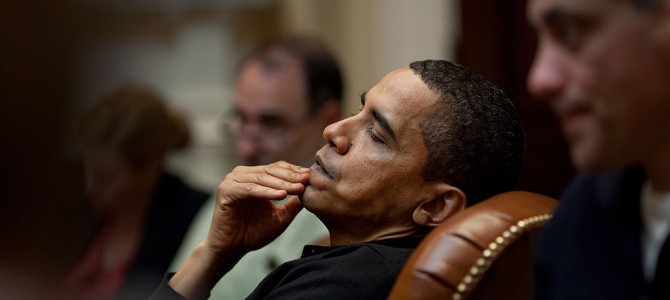From the beginning of the summer, Republican leadership backed primarily by moderates on Capitol Hill were locked in an argument with the most conservative members in the House and Senate over what their approach ought to be to the coming battles with President Obama over the continuing resolution and the debt ceiling. Leadership advanced a perspective backed by polling data, which showed people were more likely to blame a shutdown on Congress, and that they generally supported requiring spending cuts and steps to lower the deficit attached to the debt ceiling. They made the case for this as the point where they could force the Senate to pay attention to them: Harry Reid used the budget process to pass Obamacare in the first place through reconciliation, but since then, systematically ignored the normal budgeting process. The result being that the only way of getting the attention of the White House or the Senate has been resorting to the same extreme measures used under Reagan, H.W. Bush, and Clinton to extract policy changes – the “extreme” part being that unlike the other negotiating vehicles, they can’t just be ignored like every other spending bill.
Conservatives didn’t buy it. They doubted leadership’s willingness to prioritize Obamacare as the fight worth having, instead assuming they would engage in all sorts of carve-out trading for industry or policy steps which matter to K Street, of the type seen in Mitch McConnell’s latest proposal. Mostly, they doubted leadership’s willingness to actually stand and fight on the debt ceiling, expecting that they would engage in a full on freakout the instant Wall Street started calling, asking why they gave them all that money in the first place. They pushed for the fight to be over a government shutdown, in spite of the polls, knowing that this was a fight of their choosing. But some also did so because of a deeper, and more troublesome, conviction: that Obama to a degree, and Reid in particular, actually welcome the prospect of default. More than one Hill conservative believed then that the Reid had come to the conclusion that a default would be blamed not on the president at all, but on all the Republicans in the House – even if a default was the last thing any of them wanted.
This view was vindicated yesterday in dramatic fashion. Boehner announced a new offer: a short-term debt-ceiling hike in exchange for Obama negotiating on the shutdown. They would give Obama everything he wanted for six weeks while they worked something out. That something would be crafted by Paul Ryan, in a sop to the moderates, but it wouldn’t end the shutdown, in a nod to conservatives who still see some window to changing policy on Obamacare. (Most offended by the proposal were Senate Republicans, who want the shutdown ended and no debt ceiling hike without a deficit reduction agreement.) Obama and Reid have consistently said they will happily negotiate once the House has relinquished all of its negotiating leverage – Boehner wouldn’t give that up, but he would avoid default. Wall Street liked it, taking it as a sign that negotiations were going to begin, and the markets reacted positively. When spokesman Jay Carney said that Obama “would likely sign” a short-term debt limit increase, they were exuberant.
But that exuberance came too early, and may be baseless – Obama didn’t accept the offer.
So, to sum up: (1) Carney was wrong. Obama is sticking to Reid’s position of not negotiating until the debt ceiling is raised and the shutdown ends, presumably because he expects (probably rightly) that Boehner won’t have the guts to shut it down again once it’s been re-opened no matter how badly negotiations go. (2) Republicans do indeed seem to be dropping their demands about ObamaCare and accepting Ryan’s plan, even though the whole point of a short-term debt-ceiling hike from the tea party/Heritage side was that it would allow the House to focus on ObamaCare and forget about deficit reduction and tax reform for the moment. (3) Boehner might not be able to pass anything right now. House conservatives would almost certainly kill a clean CR designed to meet Obama’s demand about re-opening the government; Boehner would need Democratic votes to do it and that would leave the GOP caucus in disarray before any meaningful negotiations began. He might not be able to even pass a clean short-term debt-ceiling hike since some House Republicans will refuse to raise the debt limit without spending cuts attached and others will want Obama to make concessions on the shutdown too before agreeing to support it. And House Democrats probably won’t save Boehner on this one since they need to line up behind Obama in opposition. The good news here is that it’ll be much easier to blame Obama for a default now if we hit the debt ceiling. The not so good news is that we’re suddenly closer to actually hitting the ceiling than anyone thought.
While I still think the odds don’t favor default, I think – and have said a few times over the past few weeks – that breaching the debt ceiling was a much higher likelihood than anyone was ever giving it. This isn’t just true because the Pat Toomeys of the world – not just the Ted Yohos – believe it’s not a huge deal. It’s because Reid has been convinced all along that it would play to Democrats’ political advantage, and it appears now that Obama agrees – and that has Wall Street nervous as ever, and Republican leadership scrambling to save face. The conversations will continue today, but in a new context… one where Republicans finally understand that this in the view of the White House and Senate leadership, the debt ceiling represents the last, best Washington monument strategy ever.








